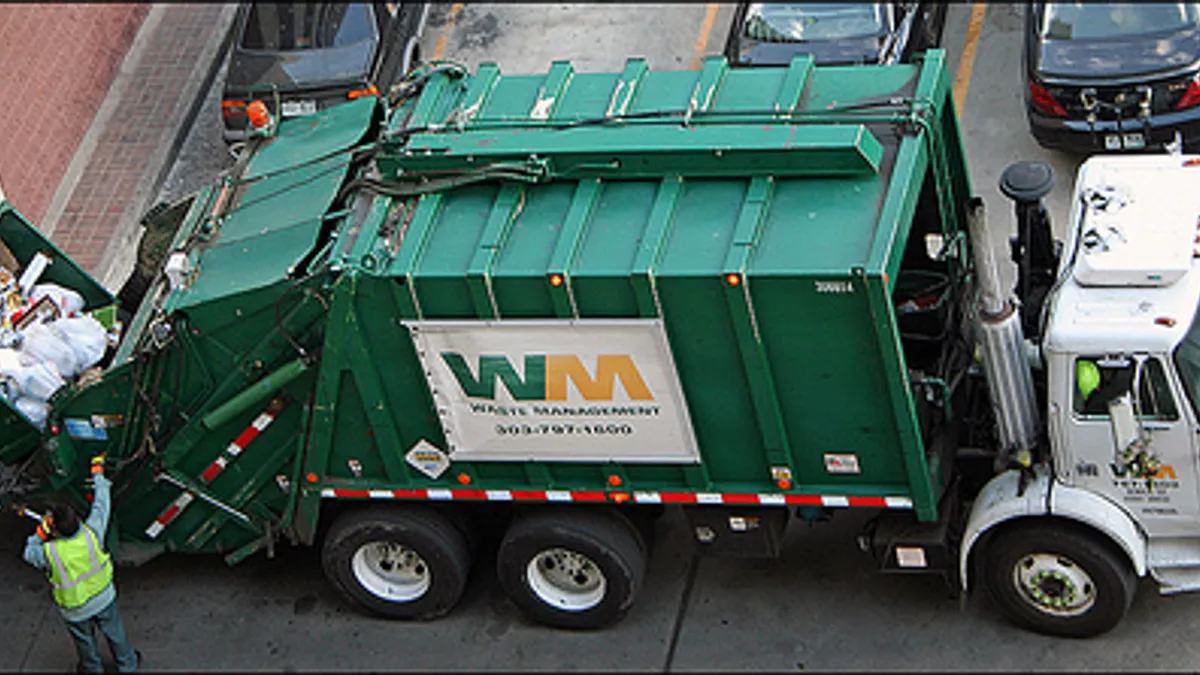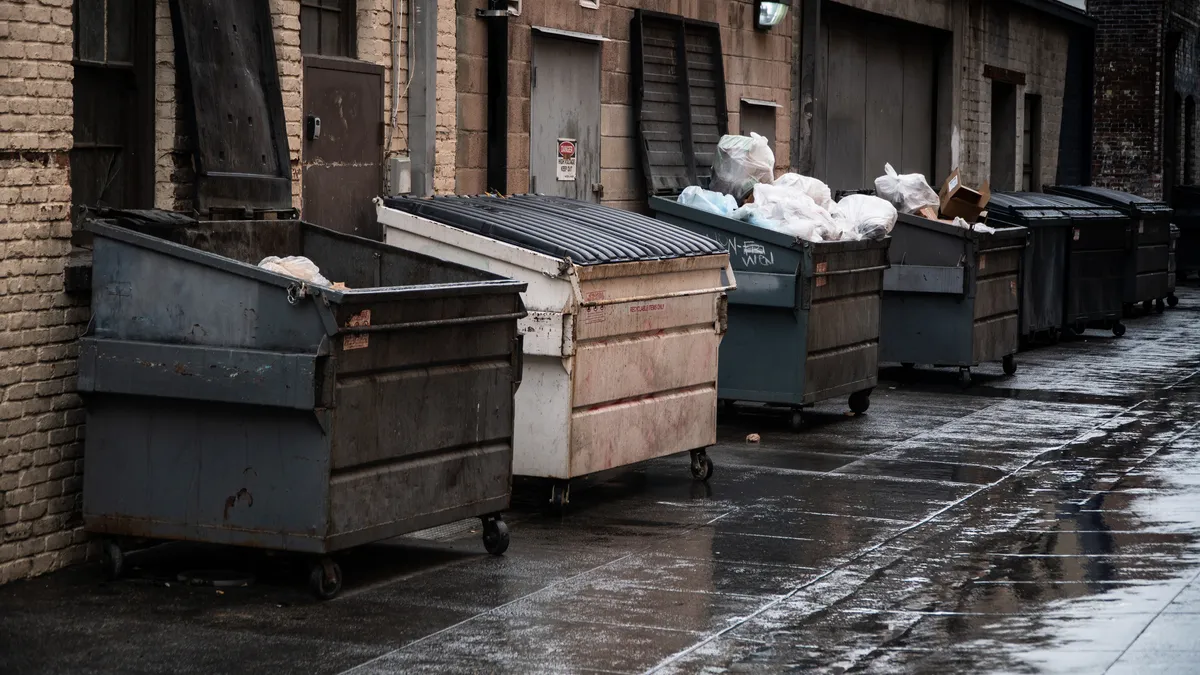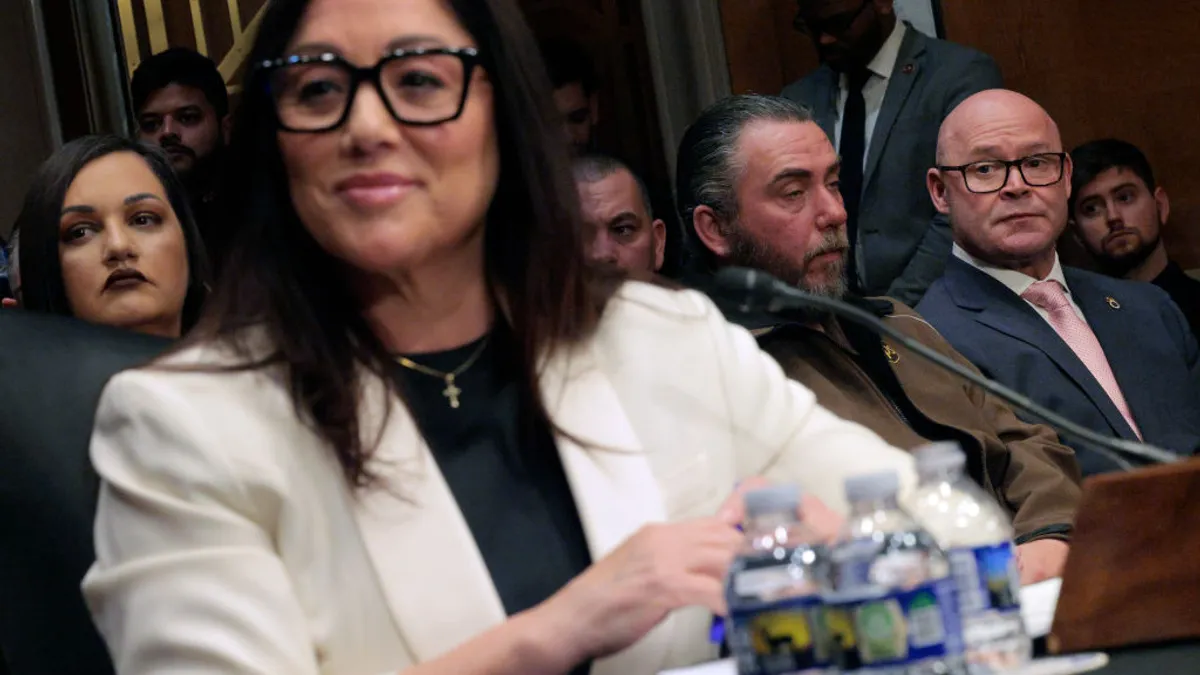In the Daily Digest, the Waste Dive team rounds up insights and moments from around the industry you may have missed.
WASTE MANAGEMENT FORFEITS $5.5M TO FEDERAL GOVERNMENT
The Houston-based company has entered into a non-prosecution agreement with the Department of Justice for employing at least 100 undocumented immigrants at its Afton, Texas facility over a period of multiple years. This comes after a five-year investigation by Homeland Security Investigations revealed three managers "actively encouraged and induced aliens to work illegally as helpers between 2003 and April 2012." This included false documentation or stolen identities for multiple employees.
A federal grand jury indicted the three managers in 2014 for conspiring to "induce and encourage unlawful immigration." All of them were later convicted.
Workers were hired by multiple staffing agencies during this period, and many "were hired or rehired at the Afton location in reckless disregard of the fact that they were not authorized to work." According to a DOJ press release, the "undocumented workforce allowed the company to maintain their preferred helper workforce to maximize profits and productivity." Waste Management is estimated to have earned nearly $5.53 million from this practice, hence the forfeiture amount.
In a statement to the Houston Chronicle, the company said it conducted an internal probe after learning of the situation, fired the three managers, and ended its relationship with the main agency involved. New measures have been added to "ensure that nothing like this ever happens again" and the company now has "an enhanced compliance program in place designed to uncover undocumented workers who seek to be involved in our operations."
Setting aside this particular case, the unsettled state of U.S. immigration policy remains a major issue for the industry — especially companies along the southern border. Immigrants are estimated to make up a growing share of new hires for frontline positions. As recruitment and retention remains an ongoing challenge, a clear path to citizenship for people currently in the country or looking to come here is seen by some in the industry as one way to help narrow that personnel gap.
IN OTHER NEWS
California legislature passes long-awaited bottle bill fix
The California Assembly passed The California Beverage Container Recycling and Litter Reduction Act (SB 452) by a vote of 74-1 on Aug. 29, a move that may help redemption center operators in the state breathe a rare sigh of relief. Nearly 1,000 of them have closed in recent years, due in part to a processing payment formula that operators believe hasn't kept up with market conditions.
Some even formed a new trade association called Protect CRV earlier this year, in a sign that more advocacy was needed. This bill has been the first piece of major legislation that the group advocated for, with a Capitol Weekly op-ed and active state house lobbying.
Sponsor Sen. Steve Glazer said in a recent press call the bill is designed "to stabilize the recycling marketplace, provide temporary immediate relief to California retailers and grocers affected by the 2016 recycling center closures and ensure consumers have local redemption opportunities." Jeff Donlevy of Ming's Recycling described the current situation as "a death spiral for those recycling centers and the programs that are still in operation because it’s going to continue to decrease the processing payments."
The new payment structure is set to take effect immediately, given it passed with an urgency clause, pending final approval from Gov. Jerry Brown. Supporters hope to see it both reverse the trend of declining recycling rates and recycling center closures.
New York expects curbside recycling costs to soar — Times Union
During yesterday's meeting at the New York Department of Environmental Conservation, Director of Recycling for Onondaga County Andrew Radin estimated that the state's post-China recycling woes could cost localities upward of $100 million. He said county projections show processing costs for curbside recyclables could increase by 1,500% as compared to 2017. While no clear resolution was reported from the session, the fact that stakeholders now have the state's attention is seen as promising if nothing else.
Anchorage, Alaska bans plastic bags, adds fees for paper — Anchorage Daily News
City Assembly members recently voted to approve a ban on plastic shopping bags at any retail or commercial business. The ban will begin on March 1, 2019. Any paper bags given to customers will incur a 10-cent fee, but people participating in federal nutrition assistance programs will not have to pay the fee. Any business found in violation of the new rules could face fines.
Portland State University and ReFED release case study — ReFED
According to the report, foodservice providers that use waste tracking and analytics solutions can save more than $1 billion. Smaller plates and trayless dining can also reduce food waste by 30%. Currently, around 900,000 tons of surplus food is wasted in the restaurant and foodservice sectors, with only 10% being recovered for donation. After an eight-week pilot program, the study found that PSU's plate waste decreased by 20% after educational signage was put up to educate students. The school also reported a 10% food donation capture rate based on an existing relationship with Urban Gleaners.
Keep America Beautiful announces 'Recycle-Bowl' program for schools
In a press release yesterday, the organization announced the start of its eighth annual youth recycling program. The four-week competition begins on Oct. 15 and asks students to collect as many recyclables as possible, with state and national champions to be announced following the competition. The organization says that participating schools usually recycle 10% more than those that don't partake.
TRASH WORLD
Japan's Environment Ministry to provide financial help for recyclers — The Japan News
The government body will offer money to organizations for purchasing advanced plastics recycling equipment. It will ask for ¥4.5 billion ($40.4 million) from the government for fiscal year 2019 and hopes that Japan will be able to deal with its own recycling rather than export material elsewhere. Japan had previously exported around 1.5 million tons of plastic to China per year.
SEEN & HEARD
The fine folks at @Earth911 created a #recycling quiz based on things we wrote about in the July/August issue of @ScrapMag. See if you can get them all right-- I failed. (Just kidding!) https://t.co/G1AJKercYH
— MeganQuinn (@MeganQuinn2) August 30, 2018
Do you have events or webinars that should be on our agenda this week? Email waste.dive.editors@industrydive.com.






















